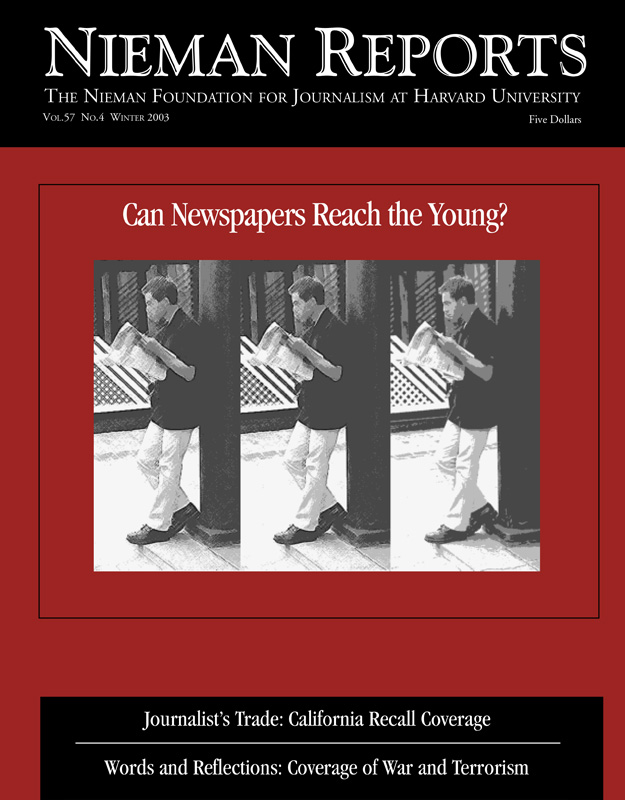RELATED ARTICLE
"Writing Stories to Reach Young Adults"
- Leslie KorenMy editors told me I’d need to lose the formal newspaper tone and spice up my stories when I took on this assignment. Now I write using the first person, directly address the reader, and just try to have fun. Some excerpts from my stories:
"Writing Stories to Reach Young Adults"
- Leslie KorenMy editors told me I’d need to lose the formal newspaper tone and spice up my stories when I took on this assignment. Now I write using the first person, directly address the reader, and just try to have fun. Some excerpts from my stories:
- I don’t even remember exactly what my boyfriend had done wrong, only that it made me very unhappy. Now I can see that the relationship was regrettable from the start. But at the time, I was new to the area and desperate to be anything but single. And so I did as generations of females, faced with similar and not-so-similar quandaries, have often done—I asked a girlfriend what to do. A week later, after following her guidance and giving him the silent treatment, we officially broke up. Another girlfriend told me never to seek that friend’s advice again.
- Women, it seems, are programmed to solicit counsel. Nature or nurture, I can’t say, but I’ve spent enough hours on both ends of the telephone to qualify as an expert on the issue. Apparently, so have dozens of other women, many of whom also had the forethought to put their so-called expertise into a book proposal, land an agent, and get it published.
- More than 40 years later, the book, including [Helen] Gurley Brown’s advice on finding, attracting and enjoying men, is going back on the market. In a new introduction, she writes about the great strides all women, including those without a husband, have made since her tell-all was first published, particularly in the career world. It’s perfect timing. We modern single girls could use a dollop of this 81-year-old’s feistiness. We may have come a long way—and there may be a lot more of us out there—but being solo, especially in your 30’s, still means sloughing off friends, family and cowork-ers who pity you for the lack of a ring on your finger and self-help gurus proffering the quickest way to get one. In Gurley Brown’s world— where pink colors the walls and a needlepoint pillow proclaims, “Good girls go to heaven, bad girls go everywhere”—there is glory for the bachelorette.
- According to the literature, the spray-on tan lasts for about five days, though mine faded significantly after three. But boy, were they three glorious days. “Did you go on vacation or something, you look nice and tan,” said the first colleague I saw upon returning to the office post-tanning. “You’re tan. What did you do to yourself?” asked my boyfriend as soon as I walked into our apartment that night. “You are sooooo tan. Where did you go?” asked my yoga teacher as she adjusted my triangle pose two days later. My response—“A new tropical island called Paramus”—was not entirely convincing. But the tan was. No one could believe it was fake. “You definitely have that glow,” said another coworker.
- Near the end of the 25-foot catwalk, past the dancers in white hot pants and under the neon pink lights, Jameel Spencer clinks shot glasses with Sean “P. Diddy” Combs and downs his tequila. Two large bodyguards flank the table. Hip-hop pulses in the Chelsea club. The time is 4 a.m., and Spencer’s work is finally done.
- It began at 8 a.m., 20 hours earlier, and in another four hours, he will wake again and drive his two children to school. But sleep doesn’t concern this man. He’ll do that when he dies, he says. Being well rested is not what got him where he is today—right-hand man to the former Puff Daddy, head of a lifestyle and marketing company, and ushered through velvet ropes from New York to St. Tropez. If he is tired, he doesn’t show it. He follows his boss out of the keyhole-shaped door, onto a well lit Manhattan street, and into his sporty silver Mercedes, which he will steer across the George Washington Bridge and into his two-car garage in Closter. This is living life in the hottest part of the flame. Speak no excuses, offer no doubts, and show no fear.
- Well, fellow suburbanites, take heart. There’s always Denny’s. Otherwise, I’m afraid, our collective hipster index is—frankly, it doesn’t exist. But there is hope. “I grew up in the suburbs,” said hipster aficionado Robert Lanham. My, how far he has come. The 31-year-old Virginia native is now ensconced in a hipster’s haven, Williamsburg, New York. He wears long sideburns, old-school mustard and burgundy Adidas (with a gray suit, no less), and suggests meeting at a café that offers free Buddhism classes. And he has come to the service of hipster wannabes everywhere. His new treatise, “The Hipster Handbook,” is an unauthorized, tell-all ethnography of those stylishly evasive and elusive followers of indie rock bands. More than an anthropological study, Lanham’s book offers vital information for the hipster in training. Besides eating at Denny’s (it has enough kitsch appeal to qualify, says Lanham, who especially likes the menus), you have to be up on styles and then you have to pretend you aren’t. No self-respecting hipster would ever admit he or she is a hipster.



